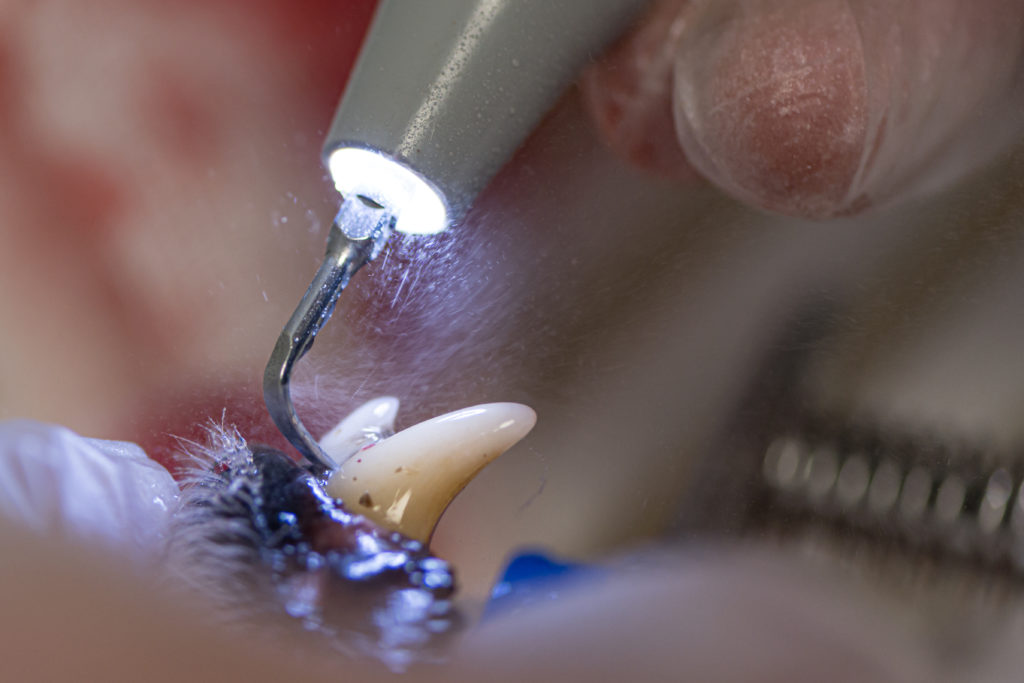
Dental Care
Many pet owners don’t realize the importance of dental care for their pets. When a pet’s mouth is not cared for, they can develop painful periodontal disease. During your regular visit, your veterinarian will examine the teeth and mouth for signs of dental disease. If they detect concerning symptoms, they may recommend follow-up dental work.
Modern veterinary medicine recognizes that dentistry is a needed, but often neglected, component of pet care. At Concord Veterinary Hospital, we prioritize dental care because we understand that a healthy mouth is an essential component of overall health. We cannot stress this enough! That’s why we have state-of-the-art dental equipment including dental radiology at our facility, along with staff specialized dental education and training, to enhance the quality and safety of our dental examinations, cleanings, and procedures.
Why Is Dental Care So Important?
Just like us, our animal companions need diligent dental care to maintain a healthy mouth. When plaque is allowed to build up and harden on the teeth it becomes tartar and can cause inflammation of the gums and breakdown of tissue and bone. This can make it painful for your pet to eat and can even eventually cause tooth loss.
Gum disease, also called periodontal disease, is extremely common in pets, with 80% of dogs and 70% of cats affected by age three. This is because most pets don’t have their teeth brushed every day, allowing plaque-forming bacteria to multiply. Fortunately, you can watch for signs of gum disease at home. If you notice any of the signs below, please call your veterinarian – it may be time for a professional pet dental cleaning in Farragut, TN.
- Bad breath (halitosis) – doggie breath is actually the first sign of gum disease
- Yellow to brown crust of plaque on the teeth
- Red, swollen gums
- Pain or bleeding during eating or refusal to eat
- Blood in food bowls or on chew toys
- Loose or missing teeth
Professional Cleanings and Extraction
We recommend dental cleanings at least once a year to prevent the spread of harmful plaque-forming bacteria and support oral health. A professional cleaning must be done under anesthesia because, unfortunately, our pets donot sit still in a chair and let use thoroughly explore their mouths. Most gum disease lurks underneath the gum line and it is impossible to clean this area on an awake dog or cat, so performing the procedure under anesthesia allows your veterinarian to reach the “root” of the problem.
Dentals are “out-patient” procedures; which means they come in in the morning and can go home that afternoon.
While here, your pet’s professional dental cleaning will include scaling and polishing of the crown, which is the visible part of your pet’s tooth. Scaling removes plaque and tartar on the crown and polishing creates a smooth surface that deters plaque and bacteria from adhering to the tooth. The veterinarians also perform a thorough oral exam and take x-rays that allow us to see the entire tooth, root and all.
In some cases, dental extractions are needed. Our veterinarians use the x-ray’s to evaluate the teeth beforehand to ensure that the extraction is necessary.
Dr. Cornelia Porter, DVM performs advanced dental and oral surgery.
At-Home Dental Care: The Best Prevention
A professional cleaning removes harmful plaque and tartar, but the best way to prevent plaque build-up before it can infect your pet’s gums and bone is to brush your pet’s teeth at home. Just as we brush our teeth every day, our animal companions can benefit from regular tooth brushing. Even if you cannot brush your pet’s teeth every day, brushing once or twice a week makes a big difference! Make sure to use a toothbrush and toothpaste designed for pets. We can also recommend dental diets and treats to help break down plaque while your pet chews.
Pet Dental Care Near You
Make An Appointment for a dental exam or cleaning, online or call us at (865) 966-4135.
Explore Our Complete List of Veterinary Services in Farragut, TN
- Rehabilitation
- Laser Therapy
- End of Life Care
- Puppy And Kitten Care
- Travel Health Certificates
- Orthopedic Surgery
- Exotic Pets
- Ultrasound
- Echo-cardiogram Services
- Walk Ins
- Urgent Care
- Pet Grooming Services
- Acupuncture
- Diagnostics
- Nutrition
- Parasite Prevention
- Vaccinations
- Wellness Exams
- Surgery
- Microchipping
- Emergency Care
